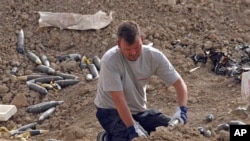Three decades of fighting, dating back to the Iran-Iraq War, have left Iraq riddled with landmines and unexploded ordnance. The United States has been working with Iraqi and international non-governmental organizations to clear farming fields and restore Iraqi access to land and infrastructure.
The U.S. has invested more than $200 million since 2003, in programs to clear unexploded ordnance and landmines and destroy excess Iraqi armaments and munitions. Funding has also gone to educating communities concerning the danger of landmines, providing prosthetics and training for landmine survivors, and even training mine detection dogs.
In 2010, the U.S. State Department's Office of Weapons Removal and Abatement provided nearly $25 million for such programs. Through this funding and the help of partners, landmines and unexploded ordnance were cleared from more than 18 million square meters across Iraq. This helped economic and agricultural development throughout the country.
Also in 2010, the State Department provided mine- and unexploded ordnance risk education to nearly 35,000 Iraqi men, women and children. One such program was through an NGO called "The Spirit of Soccer". Through training soccer coaches to teach youth about the potential risks of landmines, word was spread throughout communities in Iraq.
The State Department has funded numerous partners in this venture, from international non-governmental groups to Iraqi groups, to small local U.S. foundations and the United Nations Development Program Mine Action Team. In all efforts, the goal is not only to protect Iraqi communities from potential risk, but to develop Iraqi capacity to manage such programs independently.
According to the United Nations, as much 1,730 square kilometers of land in Iraq are still believed to contain as many as 20 million landmines and millions more pieces of unexploded ordnance. Roughly 90 percent of this area is located in agricultural lands, making clearance a necessity as well as a security priority.
The United States is the world's largest financial supporter of efforts to clear unexploded ordnance and landmines. The U.S. remains committed to helping make access to Iraqi farmland and infrastructure risk free.
The U.S. has invested more than $200 million since 2003, in programs to clear unexploded ordnance and landmines in Iraq.






















